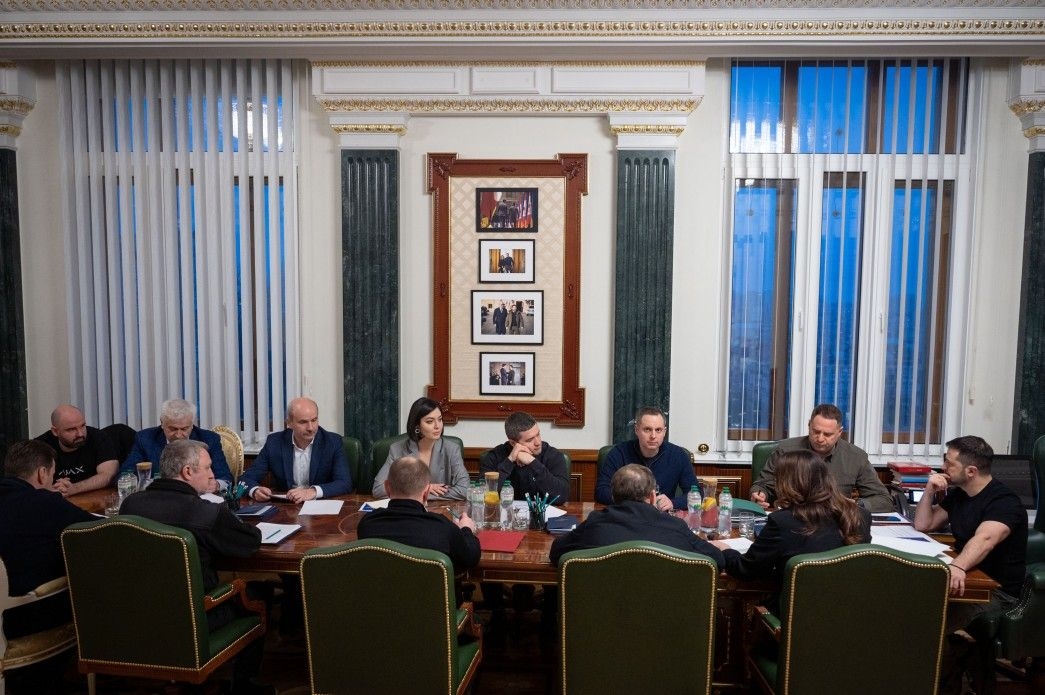Ukraine Business Roundup — February 20

The following is the Feb. 20, 2024 edition of our Ukraine Business Roundup weekly newsletter. To get the biggest news in business and tech from Ukraine directly in your inbox, subscribe here.
Tokyo summit
Japanese and Ukrainian representatives met in Tokyo on Feb. 19 to foster dialogue between both government officials and business leaders on how Japan could contribute to rebuilding the country.
The Japan-Ukraine Conference for Promotion of Economic Growth and Reconstruction in Tokyo gathered around 300 people and 80 companies, including Kubota, Sumitomo Corp, Kawasaki Heavy, and Rakuten.
During the meeting, Japan announced it would earmark 1.25 billion euros ($1.34 billion) to support Japanese investors in Ukraine. The Japanese Foreign Ministry also announced 15.8 billion yen ($105 million) in aid to Ukraine in the form of grants.
The Japanese government also said that it would be easing travel restrictions to the country after Japanese businesses said travel restrictions were preventing them from fully operating in Ukraine.
While Japan hasn’t contributed any military aid to Ukraine due to its own constitutional restrictions, it has contributed around $8 billion to Ukraine in humanitarian and financial assistance since the start of the all-out war, according to the Kiel Institute for the World Economy.
"Japan has already shown leadership in financial support to Ukraine. Now, Japan should become one of the leaders of Ukrainian recovery and investment in our economy," Prime Minister Denys Shmyhal said.

From bad to worse
Ukraine's Infrastructure Minister Oleksandr Kubrakov held urgent talks with Polish National Security Bureau head Jacek Siewiera regarding ongoing protests and blocking of buses on the Polish-Ukrainian border.
Polish farmers launched a new wave of protests at the border earlier in February, protesting a long list of grievances, including what they say is increased competition from abroad, namely imports from Ukraine, and the EU's Green Deal that imposes restrictions on farmers across the union.
The Yahodyn-Dorohusk, Uhryniv-Dolhobychuv, Zosin-Ustyluh, Rava-Ruska-Hrebenne, Medyka-Shehyni, and Korczowa-Krakovets remained blocked as of Feb. 19. Farmers extended their protests along the entire border on Feb. 20 and have threatened to keep them up until April if their demands aren’t met.
Around 3,000 trucks were waiting in line at the border with Poland as of Feb. 19, as only a few cargo vehicles per hour are allowed passage. Farmers from Germany, Belgium, the Netherlands, and France are also expected to join their Polish colleagues at the border.
While the protestors have mainly blocked commercial goods at the border, a video circulated on social media showed protestors preventing buses with passengers from crossing, prompting an outcry from Kyiv.
"The border blockade is a direct security threat to the country defending itself," Kubrakov said, saying that such actions negatively impact Kyiv's efforts to face "the common enemy," Russia.
"Women and children who sought refuge from the war and are returning home cannot become hostages of business interests."
Kubrakov also said on Feb. 19 that only 5% of the total volume of 6.7 million metric tons of Ukrainian agricultural exports went through Poland in January, saying that Polish claims that of “the oversaturation of their market are unfair.”

Taking stock
Ukraine received $42.5 billion in external financing last year, $11.6 billion of which were non-refundable grants, the Finance Ministry announced on Feb. 19.
The largest grant assistance in 2023 was provided by the U.S. ($11 billion), followed by Japan ($230.5 million), Norway ($190 million), Germany ($105 million), Spain ($50 million), Finland ($36 million), Switzerland ($30 million), Ireland ($21 million), Belgium ($3 million), and Iceland ($2 million).
As part of the overall financing last year, Ukraine also received $30.9 billion in long-term loans, including $19.5 billion from the EU, $4.5 billion from the International Monetary Fund (IMF), $3.4 billion from Japan, $1.8 billion from Canada, $1 billion from the U.K., $660 million from the World Bank, and $50 million from Spain.
As of Dec. 31, 2023, Ukraine's state and state-guaranteed debt amounted to Hr 5.5 trillion ($145 billion).
As further external financing for the country remains tied up in the U.S. Congress — which Ukraine desperately needs — the Finance Ministry has looked to reduce spending and tighten the belt.
While it earlier said it would need around the same amount for 2024, it’s brought the amount down to around $37 billion. With Ukraine only seeing $400 million in external financing in January, the country had to postpone its budget expenditures to survive the month, the Center for Economic Strategy reported.
After long delays, the EU approved on Feb. 1 the four-year support of 50 billion euros ($54 billion), but the amount is not nearly enough to cover Ukraine’s needs.

Being heard and seen
President Volodymyr Zelensky met on Feb. 15 with the newly-formed Council of Entrepreneurs to discuss businesses' issues with the government, namely the enduring problem of pressure on companies by local law enforcement.
After the arrest of investment banker Ihor Mazepa in late January, business leaders took their complaints to the very top of the Zelensky administration, demanding answers to why raids, asset seizures, and arrests had only increased since the start of the full-scale invasion.
Following the outcry, Zelensky announced a variety of measures, including a three-month moratorium on raids, changes to the Bureau of Economic Security in charge of economic crimes, and the creation of the Council of Entrepreneurs.
The idea of the council, made up of well-known businesspeople, including Monobank co-founder Oleg Gorokhovsky, co-owner of Nova Poshta Vyacheslav Klimov, founder of Ajax Systems Oleksandr Konotopsky, among others, is to foster dialogue between business and the state.
At this most recent meeting, the two sides reportedly discussed reducing pressure on businesses, reforms to the Bureau of Economic Security, digital solutions to allow businesses to give direct feedback to the government, and an electronic register of investigations that should make criminal proceedings more transparent.
It remains to be seen if all this dialogue will make a difference. For one, changes to legislation around the Bureau of Economic Security seem unlikely any time soon as two competing versions of the bill remain tied up in parliament and no one in law enforcement has been held responsible for the heavy-handed behavior.
“This work inspires me, but I am not wearing rose-colored glasses. A lot needs to be done to implement all this. The system needs a reboot in many areas, and such changes are not quick and easy to make even in peacetime, and much more difficult during the war. But the fact that there is a willingness to listen and hear undoubtedly gives us cautious optimism. We need to start moving,” Monobank’s Oleg Gorokhovsky wrote on Telegram.

The business of books
Last night as I was walking home along Kyiv’s central boulevard, I stopped to take a closer look at the shiny new location of the city’s Sens bookstore on Khreshchatyk Street.
I thought it was worth sharing with our readers that for those living in the country’s capital, it’s been impossible not to notice how many bookstores have seemingly opened up in the last two years of Russia’s full-scale invasion.
The observation isn’t just anecdotal. In the first half of 2023, nine locations of the popular bookstore chain Knyharnia Ye opened up across the country, Forbes Ukraine reported. Vivat, a publishing house, opened three stores in Kyiv, Lviv, and Ivano Frankivsk.
Since the start of the full-scale invasion, the Staryi Lev publishing house opened two new locations. Independent bookstores Misto, Knyizhkovyi Lev, Skovoroda, and Readeat opened in Kyiv.
Readeat, which like almost all new bookstores in Kyiv has a cafe attached to it, is so popular that after I received a gift card for the shop, I was warned to never go there on the weekends as it’s a total zoo.
Of course, all of this begs the question of why bookstores would be so popular during a full-scale war. Oleksandr Ryabchuk, co-founder of the Knyzhkovyi Lev (Book Lion) book store told Forbes Ukraine that there is a notable increased interest in books, but it’s also a fact that foot traffic, and thus business, is good where these stores are located in cities.
Russia’s war against Ukraine has undoubtedly stimulated a renewed interest among Ukrainians in Ukrainian history, culture, and language. As has been said many times, no one has done more to consolidate the Ukrainian nation than Putin himself.
Perusing the capital’s bookstores — which only sell books in Ukrainian (as well as occasionally in English) — one can’t help but notice a nation celebrating itself.
What else is happening
Reuters: Ukrainian businesses fear new mobilization law could paralyze economy. Ukrainian business associations are calling for reforms to the country's new mobilization law, fearing that its draft policies could cripple an already-struggling domestic economy, Reuters reported on Feb. 19. Mobilization has become a major topic of public debate in Ukraine as the all-out war with Russia continues to put pressure on the country's military. Following a series of contentious rewrites, the newest version of the mobilization bill proposes to abolish mandatory conscription for all citizens aged 18-24. The government submitted this updated draft of the mobilization law to parliament on Jan. 30, more than two weeks after withdrawing its initial, controversial version. "Business asks the parliament not to paralyze the country's economy with the new mobilization legislation," the European Business Association announced in a statement. "A balance is needed between the military front and the economy."
PM Shmyhal: Ukrainian ammunition production grew significantly in 2023. Last year, Ukraine saw notable growth in domestic ammunition production, Prime Minister Denys Shmyhal announced on Feb. 13 during a meeting of government officials. The production of mortar shells increased 42 times in 2023, and artillery shell production more than doubled. Shmyhal said he expects even more growth to occur in 2024. "We expect a new high in growth in 2024. Deregulation, which has already been carried out, will contribute to this," he said. Shmyhal said that Ukraine has established a defense-industrial committee which aims to encourage and coordinate internal production, provide development incentives, and increase joint defense ventures with global partners. He said the committee held its inaugural session last week.
World Bank to disburse $500 million for Ukrainian businesses in 2024. The World Bank and Ukraine's Economy Ministry are working to mobilize $500 million for projects supporting Ukrainian business in 2024, the ministry's press service announced on Feb. 15. The matter was discussed during a meeting between the ministry's team and the World Bank mission headed by Arup Banerji, the World Bank's regional country director for Ukraine and Moldova. As the ongoing full-scale Russian invasion continues to put pressure on Ukraine's economy and business, the World Bank plays a major role in supporting the country's economic sector. "I want to thank the World Bank for supporting Ukraine during the war," Economy Minister Yuliia Svyrydenko said. "We must synchronize the stimulation of all business sectors and focus on priority industries that create additional GDP (gross domestic product), including processing industry and export-oriented businesses," she added.
Ukraine designates Irish-American oilfield service company as international 'sponsor of war.' The Irish-American oilfield service company Weatherford International has been added to Ukraine's list of "international sponsors of war" for continuing operations in Russia, the National Agency on Corruption Prevention (NACP) announced on Feb. 15. The international sponsor of war list is designed to be "a powerful reputational tool" to encourage the exit of international business from Russia and reduce Moscow's financial ability to continue its war against Ukraine, the NACP explains on its website. Weatherford supplies equipment and services used in oil and gas drilling and production, and operates in more than 70 countries, including Russia. The company, which is headquartered in Texas, has created more than 2,500 jobs in Russia, according to the NACP. Weatherford released a statement in March 2022, in which it said the company would place new shipments on hold, suspend new investments, and not deploy new technology in Russia. "We have no active joint ventures or partnerships in Russia," the company said.
Reuters: Ukraine refuses to remove Austrian Raiffeisen bank from 'sponsors of war' list. Ukraine's National Agency on Corruption Prevention (NACP) has refused to remove Austria's Raiffeisen Bank from the international sponsors of war list, citing the bank still not having a clear plan to leave the Russian market, Reuters reported on Feb. 15. Raiffeisen Bank International (RBI) continues to operate in Russia, leading the NACP to include the bank on its list of international sponsors of war in March 2023. The bank's inclusion on the list reportedly caused Austria to stall negotiations on the 12th package of EU sanctions against Russia in December 2023. Austria eventually supported the sanctions package after Ukraine temporarily suspended the bank from the list. The NACP website now reads that the inclusion of the RBI in the international sponsors of war list is "suspended for the period of bilateral consultations involving representatives of the European Commission."
World Bank: Ukraine's recovery costs rise to $486 billion. The estimated cost of Ukraine's post-war recovery and reconstruction has risen to $486 billion over a 10-year period, according to the World Bank's Third Rapid Damage and Needs Assessment published on Feb. 15. This figure, based on data gathered between Feb. 24, 2022, and Dec. 31, 2023, is 2.8 times higher than Ukraine's nominal gross domestic product (GDP) for last year, read the report co-authored by the World Bank, the Ukrainian government, and the European Commission. The economic and human cost of Russia's aggression continues to rise as the all-out war nears its two-year mark. The World Bank's earlier assessment from March 2023 put the recovery costs at $411 billion. Ukraine also needs $9.5 billion to address immediate recovery and reconstruction priorities for 2024. Ukrainian authorities identified $15 billion for various needs this year, namely in industry, services, housing, utilities, energy, transport, and social infrastructure. As of Dec. 31, 2023, direct damage caused by Russia's war has reached almost $152 billion, with housing, transport, commerce and industry, agriculture, and energy being the most affected sectors, the report said.










